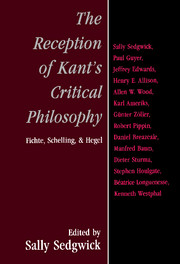Book contents
- Frontmatter
- Contents
- Notes on the Contributors
- Acknowledgments
- Introduction: Idealism from Kant to Hegel
- 1 The Unity of Nature and Freedom: Kant's Conception of the System of Philosophy
- 2 Spinozism, Freedom, and Transcendental Dynamics in Kant's Final System of Transcendental Idealism
- 3 Is the Critique of Judgment “Post-Critical”?
- 4 The “I” as Principle of Practical Philosophy
- 5 The Practical Foundation of Philosophy in Kant, Fichte, and After
- 6 From Critique to Metacritique: Fichte's Transformation of Kant's Transcendental Idealism
- 7 Fichte's Alleged Subjective, Psychological, One-Sided Idealism
- 8 The Spirit of the Wissenschaftslehre
- 9 The Beginnings of Schelling's Philosophy of Nature
- 10 The Nature of Subjectivity: The Critical and Systematic Function of Schelling's Philosophy of Nature
- 11 Substance, Causality, and the Question of Method in Hegel's Science of Logic
- 12 Point of View of Man or Knowledge of God: Kant and Hegel on Concept, Judgment, and Reason
- 13 Kant, Hegel, and the Fate of “the” Intuitive Intellect
- 14 Metaphysics and Morality in Kant and Hegel
- Bibliography
- Index
12 - Point of View of Man or Knowledge of God: Kant and Hegel on Concept, Judgment, and Reason
Published online by Cambridge University Press: 03 December 2009
- Frontmatter
- Contents
- Notes on the Contributors
- Acknowledgments
- Introduction: Idealism from Kant to Hegel
- 1 The Unity of Nature and Freedom: Kant's Conception of the System of Philosophy
- 2 Spinozism, Freedom, and Transcendental Dynamics in Kant's Final System of Transcendental Idealism
- 3 Is the Critique of Judgment “Post-Critical”?
- 4 The “I” as Principle of Practical Philosophy
- 5 The Practical Foundation of Philosophy in Kant, Fichte, and After
- 6 From Critique to Metacritique: Fichte's Transformation of Kant's Transcendental Idealism
- 7 Fichte's Alleged Subjective, Psychological, One-Sided Idealism
- 8 The Spirit of the Wissenschaftslehre
- 9 The Beginnings of Schelling's Philosophy of Nature
- 10 The Nature of Subjectivity: The Critical and Systematic Function of Schelling's Philosophy of Nature
- 11 Substance, Causality, and the Question of Method in Hegel's Science of Logic
- 12 Point of View of Man or Knowledge of God: Kant and Hegel on Concept, Judgment, and Reason
- 13 Kant, Hegel, and the Fate of “the” Intuitive Intellect
- 14 Metaphysics and Morality in Kant and Hegel
- Bibliography
- Index
Summary
There is something quite paradoxical in Hegel's presentation of Kant's Critical system in the first part of his 1802 article “Faith and Knowledge.” On the one hand, Hegel praises Kant for having expressed the “true idea of reason” in his Critique of Pure Reason and his Critique of Judgment. On the other hand, he describes the so-called pure practical reason expounded in the second Critique as resulting from a “complete trampling down of reason.” More surprising still, it seems that in effect, Hegel sees an anticipation of his own notion of reason in those explanations of judgment, in Kant's first and third Critiques, where our discursive abilities are presented as inseparable from sensibility (synthetic a priori judgments in the first Critique, aesthetic and teleological judgments in the third Critique). By contrast, he considers as a destruction of reason what Kant took to be its purest and highest use: its practical use in the autonomous determination of the will, as described in the Groundwork for the Metaphysics of Morals and in the second Critique.
What is the motivation for this peculiar appropriation of Kant's Critical system? The beginning of an answer to this question can be found already in Hegel's early theological writings, most notably, “The Spirit of Christianity and its Destiny.” There Hegel proclaimed the superiority of the moral teaching of Jesus (whose principle was love as the expression of life) over Kantian morality that teaches the bondage of inclinations and sensibility by reason and the moral law.
- Type
- Chapter
- Information
- The Reception of Kant's Critical PhilosophyFichte, Schelling, and Hegel, pp. 253 - 282Publisher: Cambridge University PressPrint publication year: 2000
- 7
- Cited by



